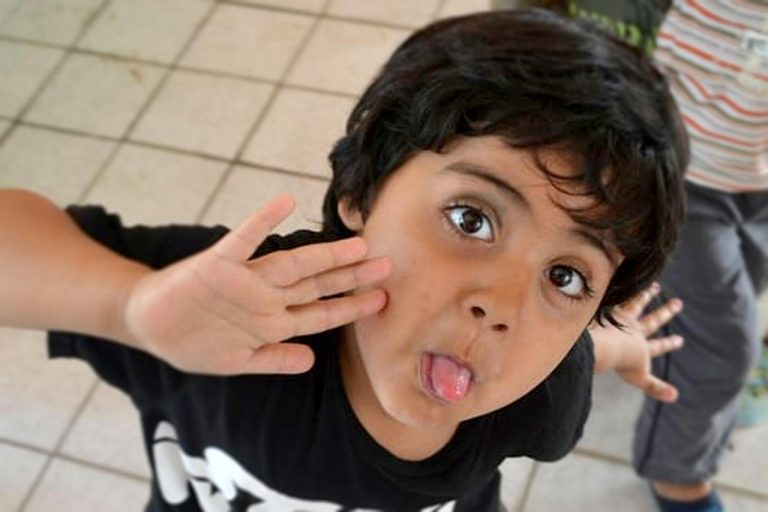The life of a child was the price of push-backs
In 2017, the European Court of Human Rights ruled that Croatia illegally expelled an Afghan family seeking asylum with their many children. The victim on whom the judgment in the case was based was a six-year-old girl, Madina, who had died. Her tragic death is a disturbing example of a ruthless migration policy similar to the practice in Hungary. The Hungarian Helsinki Committee intervened in the Strasbourg proceedings in order to promote the cause of asylum-seeking victims.
In November 2017, a family of 14 fleeing Afghans arrived in Serbia. The mother tried to get to Croatia from Serbia with her six minor children, while the rest of the family waited in Serbia.
The Croatian procedure
Croatian police arrested the family as they crossed the green border, and ordered them to return to Serbia immediately. Although the mother said they were exhausted and sought refuge, police put them in a car and took them back to the border instead of escorting the family to the nearest police station.
There, they were told to follow the train tracks and walk back to Serbia. A few minutes later, a train ran over six-year-old Madina. Doctors at the nearest station could not save her life.
The others returned to Serbia. In the Spring of 2018, the large family of 13 again crossed the Serbian-Croatian border and applied to the Croatian authorities for asylum. They were then placed in guarded accommodation in Tovarnik, but their rights to free movement and legal representation were restricted. The detention of the now ten children and their parents lasted two months. After several attempts, they were still unable to receive asylum from the Croatian authorities, so they went on to Slovenia.
The Strasbourg procedure
The family’s case landed at the European Court of Human Rights. The Hungarian Helsinki Committee (HHC) intervened primarily in the best interests of the children. The HHC stressed the principle laid down by the Strasbourg Court that in asylum cases the extreme vulnerability of children had to be prioritized over the fact that they entered the country illegally.
The Strasbourg Court shared the opinion of the Hungarian Helsinki Committee. The judgment found that the Croatian State had violated the prohibition on torture, degrading and inhuman treatment when it detained the children in a strictly guarded institution for two months. This is because children can experience confinement as a serious trauma, and that is enough in itself for child detainees to experience this situation as torture and humiliation.
The Court also found that the Croatian authorities had violated Madina’s right to life by failing to conduct a proper investigation to uncover the circumstances that led to the girl’s death. Although the Court emphasised that it was not up to it to determine whether the Croatian police could be held specifically responsible for the death of Madina by a train, the Strasbourg judges also added that the police had clearly disregarded the rules on access to the asylum procedure in the events leading up to the tragedy.
The police did not take into account that the six exhausted children and their mother were at increased risk on that night in November. Their push-back posed risks that were glaringly obvious.
Since the police pushed the family back to the Serbian side of the border without examining the individual situation of the family members or allowing the family to seek asylum in any other way, the Court also found that Croatia had violated the ban on collective expulsion.
The Hungarian attitude
It is worth recalling that Hungary was the first country to legalize collective expulsions along the Western Balkans migration route. This practice is prohibited under international law. Owing to an amendment to the law in 2016, Hungarian police were able to push everyone back to Serbia who was apprehended within 8 km of the border. The 8 km limit was lifted in March 2017. Since then, police can push-back any illegal migrant to Serbia that has been found anywhere in the country, and without any legal proceedings.
Since 2016, the Hungarian police have carried out more than 123,000 illegal push-backs. Of these, 64,457 occurred in 2021, although the Court of Justice of the European Union already ruled in December 2020 that Hungary’s relevant domestic legislation was contrary to EU law, and the European Court of Human Rights also condemned Hungary in July 2021 in the case of a pushed-back asylum-seeker. The Strasbourg judges ruled that by pushing back the asylum-seeker across the border without identifying and taking into account their individual situation, and by the fact that the victim could not apply for asylum in any other way, the Hungarian authorities had violated the prohibition of collective expulsion. However, as can be seen, this judgment did not prevent the continuation of this illegal practice.
This must stop
The practice of mass push-backs, first legalised by the Hungarian Government, has certainly contributed significantly to the fact that other countries along the Western Balkans route are doing the same. This inhumane practice has led to Madina’s death and other tragedies.
Although the Hungarian Government is reluctant to put an end to the illegal practice, despite mandatory Court rulings and the Constitutional Court’s ruling, we hope that the judgment in the case of Madina’s family sends a clear message to European governments: the practice of push-backs and denying people access to asylum procedures can lead to serious human rights abuses and, in extreme cases, even to the death of children.
